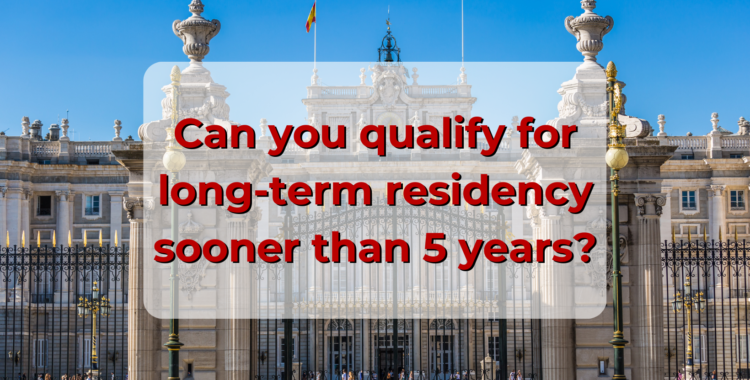Residency in Spain, sooner than five years!
Who qualifies for long-term residency in Spain without a five-year waiting period?
There are certain scenarios where individuals may bypass the standard five-year wait and become eligible for long-term or ‘permanent’ residency in Spain.
Once you’ve maintained legal and continuous residency in Spain for five years, you have the option to apply for a long-term residency card. However, it’s lesser known that there are exceptions to this five-year requirement, allowing for a faster application process.
Before delving into these exceptions, it’s important to clarify some terminology. While referred to as a “permanent residency card” or “tarjeta de residencia permanente” in Spain, the card isn’t technically permanent, as it may require renewal. Therefore, it’s more accurately described as a long-term residency permit.
So, what are the circumstances that allow skipping the five-year wait for long-term residency?
It’s important to note that the following scenarios specifically apply to EU nationals and citizens of states within the European Economic Area (EEA), encompassing Iceland, Liechtenstein, and Norway.
As per Spain’s Interior Ministry, the following individuals or groups can expedite the long-term residency process:
Employed or self-employed individuals who have reached the retirement age under Spanish law and are entitled to pension rights, provided they have worked in Spain for at least the last twelve months and continuously resided in Spain for over three years.
EU citizens married to or in a registered partnership with a Spanish citizen or someone who lost Spanish nationality through marriage or partnership with a worker.
Employed workers opting for early retirement, having worked in Spain for at least the past twelve months and continuously resided in Spain for more than three years.
Self-employed or employed workers retiring due to permanent incapacity, with over two years of continuous residency in Spain. No proof of residence period is required if the incapacity results from a work-related accident or occupational disease qualifying for a Spanish state pension.
Workers, employed or self-employed, who, after three consecutive years of working and residing in Spain, conduct economic activities in another EU member state but maintain residency in Spain, returning to Spain either daily or at least once a week. For residency purposes, periods of activity in other EU states are considered as completed in Spain.
Non-EU Citizens:
However, there are pathways for non-EU citizens to expedite the long-term residency process, or at least enjoy similar benefits.
According to the Ministry of Justice:
“Regardless of their nationality, family members of an employed or self-employed worker residing with them in Spain are entitled to permanent residence once the worker has obtained this right. They will be issued a permanent residence card as family members of an EU citizen.”
For instance, if a Chinese individual legally works and resides in Spain for five years and obtains long-term residency, their family members can join them and receive long-term residency rights without the need for a five-year waiting period.
Furthermore, migrants from Latin American countries or those with historical ties to Spain (such as Andorra, the Philippines, Equatorial Guinea, Portugal, or Sephardic Jewish nationals) are only required to be residents for two years before initiating the citizenship application process, granting them additional rights compared to long-term residency.











